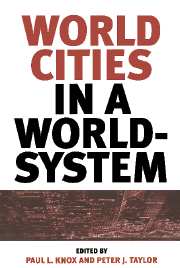Book contents
- Frontmatter
- Contents
- List of contributors
- Preface
- Part 1 Introduction: world city, hypothesis and context
- Part 2 Cities in systems
- Part 3 Politics and policy in world cities: theory and practice
- 12 Re-presenting world cities: cultural theory/social practice
- 13 Theorizing the global–local connection
- 14 The disappearance of world cities and the globalization of local politics
- 15 World cities and global communities: the municipal foreign policy movement and new roles for cities
- 16 The environmental problematic in world cities
- 17 The successful management and administration of world cities: mission impossible?
- Appendix The world city hypothesis
- Index
17 - The successful management and administration of world cities: mission impossible?
Published online by Cambridge University Press: 07 October 2009
- Frontmatter
- Contents
- List of contributors
- Preface
- Part 1 Introduction: world city, hypothesis and context
- Part 2 Cities in systems
- Part 3 Politics and policy in world cities: theory and practice
- 12 Re-presenting world cities: cultural theory/social practice
- 13 Theorizing the global–local connection
- 14 The disappearance of world cities and the globalization of local politics
- 15 World cities and global communities: the municipal foreign policy movement and new roles for cities
- 16 The environmental problematic in world cities
- 17 The successful management and administration of world cities: mission impossible?
- Appendix The world city hypothesis
- Index
Summary
My purpose in this chapter is to go some way to redressing two imbalances in the current literature about world cities. Specifically, I want first to focus not so much on the global as upon the local. In particular, I want to focus upon how large cities — some of which may be world cities however we define them — are administered and governed. All too often structures of city governance are either taken as a ‘given’, or are ignored altogether. They are almost never looked at in a comparative perspective although, importantly, the ‘politics of urban planning and development’ is included as one of the six themes in an SSRC collaborative investigation of New York, London, Paris and Tokyo (Mollenkopf 1993). In short, I want to put politics and government back into the world cities agenda.
The second imbalance I wish to address is the failure of much contemporary work to look seriously and systematically at large cities and at world cities in less developed contexts. As I have complained elsewhere (Ward 1993), so much urban analysis ignores the experiences and processes occurring in those contexts, despite the fact that this is where urbanization is occurring most dramatically, and that these centres are frequently the production loci for the so-called new international division of labour (Morris and Lowder 1992).
- Type
- Chapter
- Information
- World Cities in a World-System , pp. 298 - 314Publisher: Cambridge University PressPrint publication year: 1995
- 4
- Cited by



